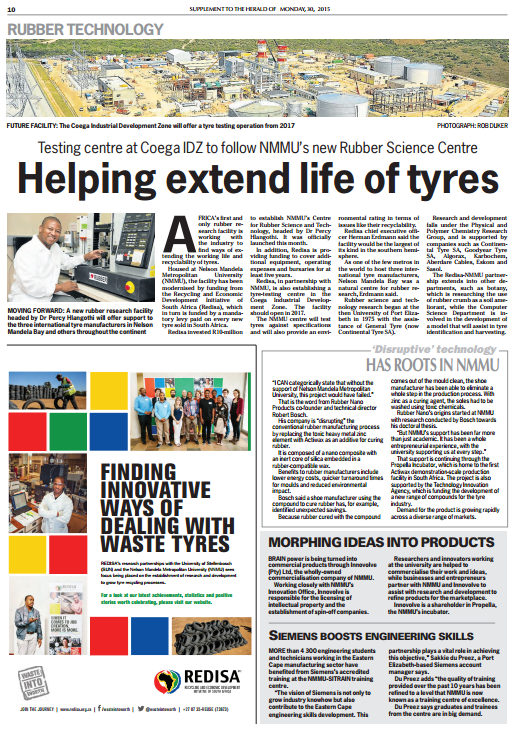Read the full article below:
AFRICA’s first and only rubber research facility is working with the industry to find ways of extending the working life and recyclability of tyres.
Housed at Nelson Mandela Metropolitan University (NMMU), the facility has been modernised by funding from the Recycling and Economic Development Initiative of South Africa (Redisa), which in turn is funded by a mandatory levy paid on every new tyre sold in South Africa.
Redisa invested R10-million to establish NMMU’s Centre for Rubber Science and Technology, headed by Dr Percy Hlangothi. It was officially launched this month.
In addition, Redisa is providing funding to cover additional equipment, operating expenses and bursaries for at least five years.
Redisa, in partnership with NMMU, is also establishing a tyre-testing centre in the Coega Industrial Development Zone. The facility should open in 2017.
The NMMU centre will test tyres against specifications and will also provide an environmental rating in terms of issues like their recyclability.
Redisa chief executive officer Herman Erdmann said the facility would be the largest of its kind in the southern hemisphere .
As one of the few metros in the world to host three international tyre manufacturers, Nelson Mandela Bay was a natural centre for rubber research, Erdmann said.
Rubber science and technology research began at the then University of Port Elizabeth in 1975 with the assistance of General Tyre (now Continental Tyre SA).
Research and development falls under the Physical and Polymer Chemistry Research Group, and is supported by companies such as Continental Tyre SA, Goodyear Tyre SA, Algorax, Karbochem, Aberdare Cables, Eskom and Sasol.
The Redisa-NMMU partnership extends into other departments, such as botany, which is researching the use of rubber crumb as a soil ameliorant, while the Computer Science Department is involved in the development of a model that will assist in tyre identification and harvesting.
